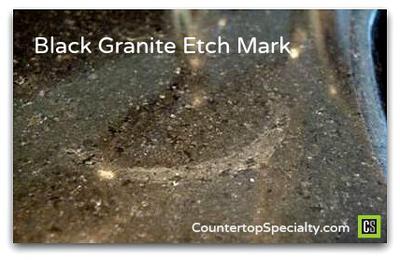Stains on Black Galaxy Granite
QUESTION:
I had black galaxy granite countertops installed in my wet bar.After one family event, there were glass ring "etched" stains all over the counter.
I've tried cleaning the granite countertops, but the spots will not come off with anything I've tried. My bar is ruined now!
What can I do to repair?
ANSWER:
First, some background info on Black Galaxy just FYI. Black Galaxy granite is (as a general rule) very stain resistant. It is quite possibly the most bullet-proof surface on the market.Most liquids/substances will evaporate before they'd ever stain, so there's rarely an issue cleaning granite countertops with Black Galaxy.
In fact, Black Galaxy typically cannot be sealed. Sealers just won't absorb. With marble, you will get glass rings from etching, but granite does not commonly etch.
Granite can be etched... just not easily. And some stones sold as granite will etch more easily, but these are rare.
Black Galaxy granite is not one of these and will not etch without extreme exposure to acids. Party drinks are not acidic enough to etch this natural stone.
So, it isn't the stone itself that is the problem. One of three things (or possibly a combo) is causing the "etching."
Possible problems:
1. A sealer was erroneously applied
2. The granite has been "doctored"
Applying a sealer when not needed (to a stone that cannot absorb it) will often result in a streaky/hazy film left on top.
You may not get the streaks, if the sealer was wiped off the granite countertop adequately, but the sealer residue inevitably left on the granite is sometime sensitive to acids like in alcoholic drinks, fruits, sodas, coffee, etc.
"Doctored" granite countertops are a problem with black granites. A black paint / polish / wax / dye is applied to cheaper, gray granites to make them more black, and more expensive.
This is usually a problem with absolute black and not so much with black galaxy granite. Doctored stone surfaces will readily etch from common acidic foods, drinks and products creating dull spots and "glass-rings" just like marble.
Again, it isn't the natural stone itself that is etching. It's the coating applied to the surface when "doctoring" the granite that is etching.
A third possibility is that you don't have Black Galaxy, but a "mutt" stone that contains calcite (a mineral reactive with acids and possibly prone to staining, but I doubt this is it).
Here's how you can determine if you have doctored granite or not.
Get some methylene chloride... a potent and noxious solvent usually found in "paint strippers". Won't hurt your granite countertop, but it will take off whatever is on top and along with the finish off cabinets and walls and anything else, so be careful and have
Or acetone... It's not as powerful, but easier to use and often works fine for testing doctored countertops.
- On a small area over a glass-ring, pour out a little methylene chloride (or acetone). Let is soak for a bit, then agitate/scrub the area with a soft-bristle brush. Wipe completely dry.
- If yes, you have doctored granite. That is fraud and you have a legal issue with the warehouse/company that sold it.
- If no color change, is the glass-ring gone? If yes, then there was probably sealer on the surface that is causing these reactions.
Confirm the diagnosis:
Assuming you were able to strip and clean off any doctoring substance (you may want to use the methylene on this spot a couple times), then....
Spill some lemon juice on the same spot. Let it sit for a few minutes and wipe up. Any dull or light spot? There shouldn't be, since the it's directly on the granite surface.
Spill lemon juice on a spot that wasn't cleaned. Any spot? It should leave a spot, an etch mark like the glass-rings, so....
If yes, then you have your answer. There is something on the surface that needs to come off.... either sealer residue or a doctoring compound.
If a bright shiny Black Galaxy granite that doesn't etch is revealed after cleaning with methylene chloride, then it's sealer residue on the surface. Repeat the stripping process over the entire surface. This should eliminate the etching issue (for this "sealer residue" scenario).
If the color changes and you end up with a gray granite countertop after stripping off the dye with MC, then it's been doctored and I'd go back to the installer and demand a new countertop. Hopefully they will correct it. If not, you should contact a lawyer to send a letter, etc., to motivate them.
The only other options at this point are to:
- Re-dye or re-doctor the surface
- Apply a color-enhancing sealer, if possible
- Live with the new gray-colored granite
Nothing on the surface?
If you make it through all the above tests, trials and tribulations without any change or evidence of a substance on the surface, then you are the one-in-a-million to get stuck with a rare "mutt" granite that does etch. Nothing can be done about this. Live with it or replace it.
Be sure to do the lemon juice test for sealing granite on the new replacement slab (and any stone you intend to purchase) prior to installation, though, and you'll avoid this type of granite care nightmare with your next installation.
Comments for Stains on Black Galaxy Granite
|
||
|
||
|
||
|
||
|
||
|
||
|
||
|
||
|
||
|
||
|
||
|
||
|
||
|
||




